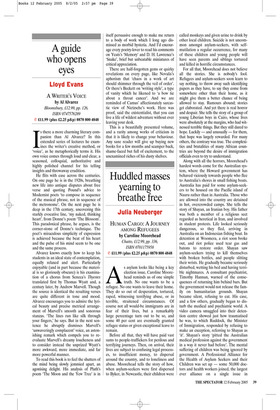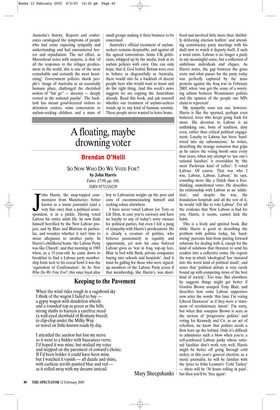Huddled masses yearning to breathe free
Julia Neuberger
HUMAN CARGO: A JOURNEY AMONG REFUGEES by Caroline Moorehead Chatto, £12.99, pp. 336, ISBN 0701175958 ✆ £11.99 (plus £2.25 p&p) 0870 800 4848 As asylum looks like being a key election issue, Caroline Moorehead reminds us of one simple truth. No one wants to be a refugee. No one wants to leave their home. They do so out of desperation, tortured, raped, witnessing terrifying abuse, or in terrible, straitened circumstances. Of course not all would-be immigrants are in fear of their lives, but a remarkably large percentage turn out to be so, and some 40 per cent are eventually granted refugee status or given exceptional leave to remain.
Before all that, they will have paid vast sums to people-traffickers for perilous and terrifying journeys. Then, on arrival, their lives are subject to confusing legal processes, to insufficient money, to dispersal around the country, and to loneliness and abuse. Moorehead tells the story of how, when asylum-seekers were first dispersed to Byker, in Newcastle, their children were called monkeys and given urine to drink by other local children. Suicide is not uncommon amongst asylum-seekers, with selfmutilation a regular occurrence, for many of these children and young people will have seen parents and siblings tortured and killed in horrific circumstances.
For all that, Moorehead does not believe all the stories. She is nobody’s fool. Refugees and asylum-seekers soon learn to say nothing, to throw away such identifying papers as they have, to say they come from somewhere other than their home, as it might give them a better chance of being allowed to stay. Rumours abound; stories get elaborated. And yet there is real horror and despair. She tells the story of a group of young Liberian boys in Cairo, whose lives were absolutely at the margins, who had witnessed terrible things. But they still dared to hope. Luckily — and unusually — for them, that hope was largely rewarded. For many others, the contrary was true. The complexities and brutalities of many African countries are beyond the desire of immigration officials even to try to understand.
Along with all the horrors, Moorehead’s hardest words come for the Australian system, where the Howard government has behaved viciously towards people who flee to Australia’s shores in small fishing boats. Australia has paid for some asylum-seekers to be housed on the Pacific island of Nauru rather than in Australia. Those who are allowed into the country are detained in hot, overcrowded camps. She tells the story of Shayan, an Iranian boy. His father was both a member of a religious sect regarded as heretical in Iran, and involved in student protests. Life looked seriously dangerous, so they fled, arriving in Australia on an Indonesian fishing boat. In detention at Woomera, a riot soon broke out, and riot police used tear gas and batons to restore order. Shayan saw asylum-seekers trying to kill themselves with broken bottles, and people slitting their wrists. He gradually became seriously disturbed, wetting his bed and having terrible nightmares. A consultant psychiatrist, Timothy Hannan, warned of the consequences of returning him behind bars. But the government would not release the family on humanitarian grounds. Shayan became silent, refusing to eat. His case, and a few others, gradually began to disturb the medical and psychiatric world. A video camera smuggled into their detention centre showed just how traumatised he was, to which Ruddock, the Minister of Immigration, responded by refusing to make an exception, referring to Shayan as ‘it’. Shayan’s story ‘pitted the Australian medical profession against the government in a way it never had before’. The mental suffering of children was being ignored by government. A Professional Alliance for the Health of Asylum Seekers and their Children was set up — some 50,000 doctors and health workers joined, the largest ever alliance on a single issue in Australia’s history. Reports and conferences catalogued the symptoms of people who had come expecting sympathy and understanding and had encountered horror and repudiation. The net effect, as Moorehead notes with surprise, is that ‘of all the responses to the refugee predicament in the world, this is one of the most remarkable and certainly the most heartening’. Government policies shook people’s ‘image of Australia as an essentially humane place, challenged the cherished notion of “fair go” — decency — deeply rooted in the national psyche’. The backlash has meant good-hearted visitors to detention centres, some concessions to asylum-seeking children, and a mass of small groups making it their business to be concerned.
Australia’s official treatment of asylumseekers remains despicable, and against all the agreed conventions. Some UK politicians, whipped up by the media, look at its asylum policies with envy. One can only hope, that if, God forbid, Britain were ever to behave as disgracefully as Australia, there would also be a backlash of decent people here who would want to know and do the right thing. And this week’s news suggests we are copying the Australians already. Read this book, and ask yourself whether our treatment of asylum-seekers stands up to any kind of humane scrutiny. These people never wanted to leave home. lived and involved little more than ‘dutifully delivering election leaflets’ and attending constituency party meetings with his dad) now to watch it departy itself, if such a word exists. Labour is no longer a party in any meaningful sense, but a collection of ambitious individuals and cliques. As Harris notes, the gap between the grass roots and what passes for the party today was perfectly captured by the mass protests against the Iraq war in February 2003, when ‘one got the sense of a worrying schism between Westminster politics and the opinion of the people our MPs claim to represent’.
My sympathy soon ran out, however. Harris is like the spurned, perhaps even battered, lover who keeps going back for more. His devotion to Labour is an unthinking one, born of tradition, duty even, rather than critical political engagement. Loyalty to Labour has been ‘hardwired into my subconscious,’ he writes, describing the strange sensation that grips as he enters the voting booth once every four years, when any attempt to ‘use one’s rational faculties’ is overridden by ‘the most Pavlovian kind of reflex’: ‘I voted Labour. Of course. That was who I was. Labour, Labour, Labour,’ he says, sounding more like a Dalek than a freethinking, unmolested voter. He describes his relationship with Labour as an ‘addiction’, and despite the war, the foundation hospitals and all the rest of it, he would ‘still like to vote Labour’. For all the evidence that New Labour is bad for you, Harris, it seems, cannot kick the habit.
This is a lively and spirited book. But while Harris is good at describing the problem with politics today, his ‘hardwiring’ prevents him from putting forward solutions for dealing with it, except for the kind of solutions that threaten to send his readers into a collective coma. He regrets the way in which ‘ideological’ has ‘mutated into the worst kind of political insult’, and notes that ‘political debate is very rarely bound up with competing views of the best kind of society’. Too true. But elsewhere he suggests things might get better if Gordon Brown usurped Tony Blair, and describes how some Labour supporters now utter the words ‘this time I’m voting Liberal Democrat’ as if they were a ‘statement of revolutionary intent’. I’m sorry, but when that sourpuss Brown is seen as the saviour of ‘progressive politics’ and voting for Kennedy and Co. as an act of rebellion, we know that politics needs a firm boot up the behind. Only it’s difficult to administer such a blow when you’re a self-confessed Labour junky whose rational faculties don’t work very well. Harris might be better off going through cold turkey at this year’s general election; as a music journalist, he will be familiar with the lyrics to John Lennon’s ‘Cold Turkey’ — there will be ‘36 hours rolling in pain’, but then you’ll be ‘free again’.














































 Previous page
Previous page